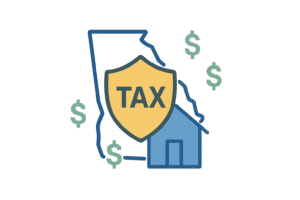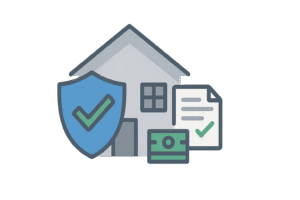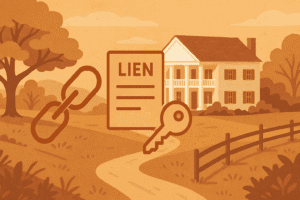How To Negotiate a Pre-Foreclosure and Save Your Home
If you’re wondering how to negotiate a pre-foreclosure, you’re not alone! Facing a potential foreclosure can be overwhelming and leave you feeling helpless. Don’t lose…

If you’re wondering how to negotiate a pre-foreclosure, you’re not alone!
Facing a potential foreclosure can be overwhelming and leave you feeling helpless.
Don’t lose hope! This article will equip you with the knowledge and steps to negotiate with your lender and potentially save your home.
Imagine the peace of mind and continued security of staying in your home. Start your journey towards saving your home by reading this comprehensive guide and taking action today!
What is Pre-Foreclosure Negotiation?
Pre-foreclosure negotiation is the period that occurs after a homeowner misses mortgage payments but before the formal foreclosure process begins. During this time, the lender usually sends a “notice of default” outlining missed payments and potential consequences. This critical stage allows the homeowner and the lender to communicate and explore solutions to prevent foreclosure through negotiation.
Pre-foreclosure negotiation is a proactive measure compared to a public auction or trustee sale. It’s a collaborative effort between homeowners and lenders to find a solution before the property enters foreclosure proceedings.
By engaging in pre-foreclosure negotiation, homeowners facing financial challenges can discuss alternatives with their lenders, potentially salvaging their homes from repossession and economic turmoil.
Typically initiated after issuing a notice of default, the pre-foreclosure stage signifies a pivotal moment where homeowners can work towards a mutually beneficial agreement to avert the dire consequences of a full foreclosure.
During this pre-foreclosure stage, homeowners have a window of opportunity to avoid an actual foreclosure, which can severely impact their credit score. They can negotiate with the mortgage lender for a revised payment plan, potentially preventing a foreclosure filing.

Reasons To Consider Pre-Foreclosure Negotiations
For a property owner, pre-foreclosure negotiation is critical in preserving homeownership and credit rating. It’s a chance to work out a repayment plan or loan modification with the lending institution, potentially preventing further legal action.
Here are some key reasons to consider:
1. Avoiding foreclosure and its consequences: The most apparent reason for considering pre-foreclosure negotiations is to avoid the dire consequences of a full foreclosure. Foreclosure proceedings can result in the loss of the property, damaging the homeowner’s credit score and causing financial instability.
2. Protecting homeownership: Pre-foreclosure negotiations allow homeowners to save their homes from being repossessed by the bank or mortgage lender. With a revised payment plan or loan modification, they may be able to continue making payments and keep ownership of their property.
3. Maintaining credit rating: A foreclosure can significantly impact an individual’s credit score, making it difficult to obtain future loans or credit cards. It is important to continue making timely payments on any other debts and maintain good financial habits, such as keeping credit card balances low and paying bills on time.
How to Negotiate a Pre-Foreclosure: Step-by-Step Instructions
Navigating the pre-foreclosure stage requires a strategic approach that involves several key steps to help you address the situation effectively:
1. Acknowledge and Understand the Situation:
Start by carefully reviewing your loan documents to understand the terms and any missed payments. Collect essential documentation, including income statements, hardship explanations, and previous communications with your lender. Before reaching out to the lender, take the time to assess your financial situation thoroughly. Understanding your ability to manage monthly mortgage payments will enable you to engage in open and honest discussions.
2. Contact Your Lender Immediately:
Initiate proactive communication with your lender without delay. Taking the first step is the best way to demonstrate your commitment to resolving the issue. Proactively reaching out may increase your chances of negotiating favorable terms, such as a lower interest rate or modified loan conditions. Clearly express your intention to save your home and collaborate on finding a viable solution.
3. Explore Available Options:
Consider various solutions to address your financial challenges:
- Repayment Plan: Work with your lender to establish a repayment plan that allows you to catch up on missed payments and maintain a sustainable payment schedule.
- Loan Modification: Discuss the potential for modifying your loan terms, such as extending the loan duration or reducing the interest rate to make payments more manageable.
- Forbearance: Request temporary relief by suspending or reducing your monthly payments in response to a temporary financial hardship.
- Short Sale: If necessary, explore selling your home for less than the outstanding mortgage balance to settle the debt and avoid foreclosure.
By following these detailed steps and exploring available options, you can navigate the pre-foreclosure stage with a proactive and informed approach, increasing your chances of finding a suitable solution to protect your home.
Key Considerations For Successfully Negotiating Pre-Foreclosure
Legal guidance, timely action, and a flexible approach are essential. Engaging real estate attorneys can help property owners understand their rights and options.
For investors, doing due diligence, including a title search with a title company and inspecting the property, is critical. Additionally, being open to creative solutions and proactive communication can make a significant difference in reaching a successful outcome.

Understanding Your Rights and Legal Obligations During Pre-Foreclosure
Navigating through the pre-foreclosure stage can feel like a maze. Still, with the proper knowledge and understanding of your legal rights and obligations as a property owner, you can effectively participate and make informed decisions. Here’s a breakdown:
- Notice of Default: One of your fundamental rights is to receive a written notice of default if you fall behind on your mortgage payments. This critical document outlines the amount owed and provides a timeline for action, informing you of the potential consequences of non-payment.
- Request a Meeting: Don’t forget you have the right to request a meeting with your lender or loan servicer to discuss options for avoiding foreclosure, such as loan modification or repayment plans.
- Your Legal Obligations: Equally important is understanding your legal obligations. These include continuing to pay property taxes, maintaining home insurance, and upholding the terms of your mortgage agreement. Remember, failing to fulfill these obligations could strengthen the lender’s case for foreclosure.
- Seek Legal Guidance If Necessary: Pre-foreclosure can be stressful, but you’re not alone. Consider consulting with a real estate attorney familiar with your state’s foreclosure laws for valuable guidance and protection of your rights.
- Open Communications: Lastly, remember that the pre-foreclosure stage offers a time frame for open communication and exploring solutions.
By understanding your rights and obligations, taking proactive steps, and potentially seeking professional guidance, you can navigate this situation effectively.
Taking it to the Next Level: Enhancing Pre-Foreclosure Negotiation.
Whether you’re a homeowner seeking to save your pre-foreclosure property or an investor looking for a good deal, you can enhance your pre-foreclosure negotiation experience.
For homeowners, consider seeking professional guidance. Financial counseling can help you develop a budget, explore debt management strategies, and build a solid financial foundation for the future.
Additionally, exploring credit repair strategies and focusing on long-term financial planning can demonstrate your commitment to responsible financial management to your lender, potentially strengthening your negotiating position.
For real estate investors, knowledge is power. Understanding public records like lis pendens (notice of a potential lawsuit affecting the property title) and foreclosure proceedings can equip you to identify preforeclosure homes earlier in the process, potentially leading to less competition than entirely foreclosed homes. You can also leverage resources like local newspapers, direct mail marketing, or online platforms to connect with homeowners in financial distress and explore opportunities to purchase their distressed properties.
However, ethical practices and genuine concern for the homeowner’s situation are crucial.
It’s important to remember that patience is vital. While an ASAP cash offer might be tempting for a homeowner facing immediate financial pressure, taking the time to research comparable properties, understand the fair market value and potentially secure pre-approval for a traditional mortgage loan can lead to a more sustainable solution for both parties.
By taking these steps, navigating pre-foreclosure negotiations becomes a more informed and potentially more successful experience for homeowners and investors.

Alternatives to Pre-Foreclosure Negotiation
Homeowners still have options if pre-foreclosure negotiation doesn’t yield a satisfactory outcome. A short sale negotiated with the help of a real estate agent allows the property to be sold for less than the outstanding mortgage balance, potentially preventing foreclosure and minimizing damage to the homeowner’s credit history. Another option is debt consolidation, combining multiple debts into a single loan with a lower interest rate and monthly fee. This can simplify financial management and potentially free up cash flow, making mortgage payments more manageable.
While exploring these alternatives, remember that communication with your lender is crucial.
For homeowners unable to sell their property through a short sale or manage debt consolidation effectively, a deed in lieu of foreclosure may be a viable option. This involves formally transferring the deed of ownership to the lender in exchange for forgiving the mortgage debt. While this can alleviate the immediate financial burden of foreclosure, it’s important to understand the potential impact on credit history and tax implications before proceeding. Consulting with a financial advisor and legal professional can provide valuable guidance when considering a deed in lieu of foreclosure.
Wrapping Up and My Experience With Pre-Foreclosure Negotiation
In conclusion, pre-foreclosure negotiation can be a powerful tool for homeowners facing financial challenges. Drawing from my experience as an attorney assisting clients with this intricate process, I have witnessed the transformative potential it carries for all parties involved.
Whether you are aiming to protect your family’s home from foreclosure or seeking to secure a promising investment opportunity, delving into the realm of pre-foreclosure negotiations can represent a significant stride towards achieving your desired outcomes and securing a stable financial future.
Understanding pre-foreclosure nuances equips you with knowledge and empowers you to make informed decisions that could positively shape your economic trajectory.





